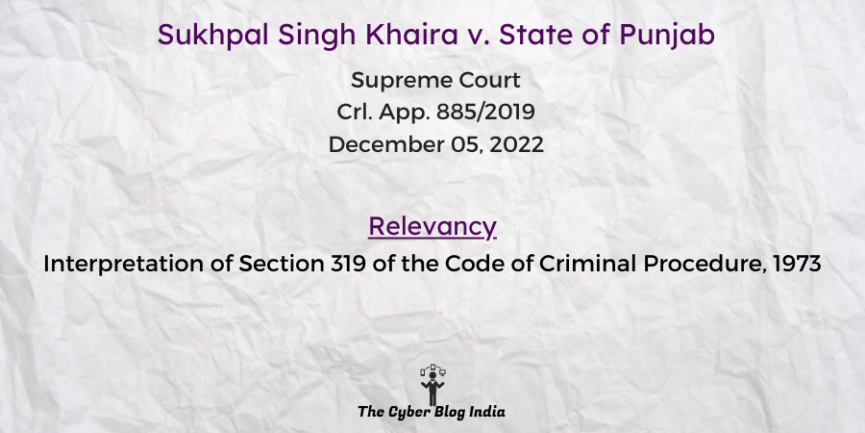Sukhpal Singh Khaira v. State of Punjab

Sukhpal Singh Khaira v. State of Punjab
2023 1 SCC 289
In the Supreme Court of India
Crl. App. 885/2019
Before Justice S. Abdul Nazeer, Justice B.R. Gavai, Justice A.S. Bopanna, Justice V. Ramasubramanian and Justice B.V. Nagarathna
Decided on December 05, 2022
Relevancy of the case: Interpretation of Section 319 of the Code of Criminal Procedure, 1973
Statutes and Provisions Involved
- The Information Technology Act, 2000 (Section 66)
- The Code of Criminal Procedure, 1973 (Section 319, 311, 235, 360, 354, 353)
- The Arms Act, 1959 (Section 25A)
- The Narcotic Drugs and Psychotropic Substances Act, 1985 (Section 21, 24, 25, 27, 28, 29, 30)
Relevant Facts of the Case
- The police registered a case under the NDPS Act against 11 accused persons. As one of the accused was unavailable, his case was bifurcated. On July 21, 2017, the prosecution filed an application under Section 319 of the Code of Criminal Procedure, 1973. The trial court thereby pronounced the judgment in the initial case while passing an order against the applicant to appear and face trial.
- The appellant challenged the order based on the fact that the court’s order was passed after the completion of the proceedings,
- The High Court ruled that Section 319 can operate at a stage before the judgment’s pronouncement. However, the trial court can summon an accused based on the evidence available in the bifurcated case. It cannot do so on the basis of evidence collected in the concluded trial.
Prominent Arguments by the Advocates
- The appellant’s counsel argued that the order was invalid as the trial was complete. He relied on Hardeep Singh v. State of Punjab to emphasise the trial court’s limited power under Section 319. He also contended that it violated Section 353(1) as the court exercised its summoning powers after the pronouncement of the judgment.
- The respondent’s counsel submitted that in case of conviction, the trial gets completed only after sentencing. The accused is allowed to lead evidence at this stage; hence, it cannot be said that the proceedings are terminated after the arguments.
Opinion of the Bench
- When the trial court pronounces the judgment, a trial gets concluded for an acquitted person. For a convicted person, it happens when the court imposes the sentence.
- For summoning an additional accused person under Section 319, the trial has to be a fresh trial. In the case of a joint trial, the court cannot rely on the evidence of an ongoing trial.
- In a bifurcated trial, an order under Section 319 will not be valid merely because evidence is present in the main trial.
- When a trial court summons an accused on the same day as the sentencing, the facts and circumstances of the case must be considered. The order would not be sustained if passed after the sentencing.
Final Decision
- The bench ordered the Registry to place the matter before the appropriate bench for its conclusion and issued guidelines for following proper procedure when invoking Section 319.
